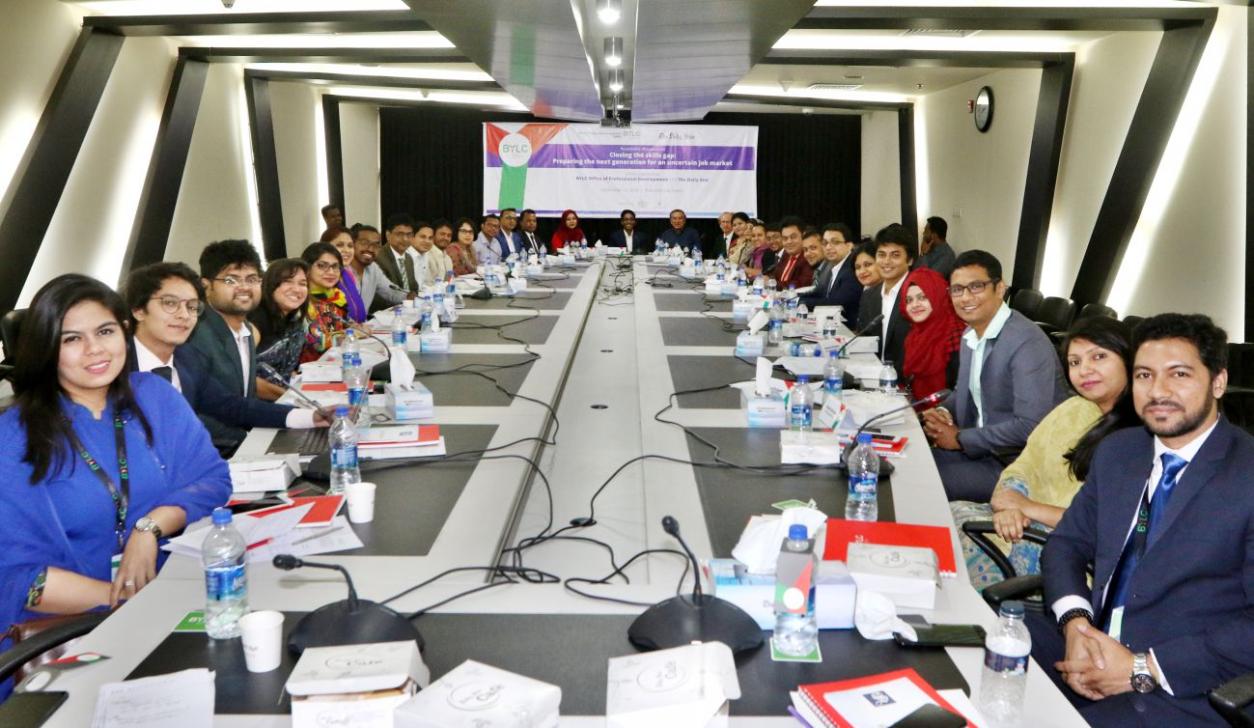Keep spending on skills development: experts

Adequate and constant investment in human capital and skills development are the essentials to preparing the next generation for uncertainties of the future job market, International Monetary Fund's resident representative for Bangladesh said yesterday.
Rapid technological innovation and active labour market policies are also required, said Ragnar Gudmundsson.
He spoke at a roundtable on “Closing the skills gap: Preparing the next generation for an uncertain job market”.
Bangladesh Youth Leadership Centre (BYLC) in partnership with The Daily Star organised the discussion at The Daily Star Centre in the capital.
Investment in human capital means higher public spending on vocational education—which is very insignificant in Bangladesh—and training and higher education, said Gudmundsson.
It is crucial for Bangladesh to reduce reliance on readymade garments as an export and job creation engine because the sector will become more capital intensive and automated in the next few years, he said.
Citing a study of the Centre for Policy Dialogue, he said automation was already playing a role in the sector while women's share in the workforce was declining.
Bangladesh's focus should now be on shipbuilding, pharmaceuticals, information technology and low carbon initiatives, the latter stemming from the fact that Bangladesh has always been at the forefront of discussions on climate change impacts, added Gudmundsson.
Focusing on a low carbon economy makes sense as a recent study showed that adopting it to meet challenges of climate change could potentially create 65 million jobs worldwide, he said.
The IMF official said though Bangladesh was putting emphasis on creating new economic zones, which would create a lot of jobs, the required skilled human resource for attracting foreign investors was not available here. “I have had discussions with some foreign banks. They want to invest in Bangladesh but they are concerned about having the right skills,” he added.
So special training should be introduced for new recruits as many of them may initially lack the required skills, said Gudmundsson.
Assistant Professor Homayara L Ahmed of the Institute of Business Administration at the University of Dhaka said universities were grooming students to bridge the gap with industry needs but imparting skills was not an individual responsibility and should start at the school level.
Organisations also have to take up the responsibility of grooming graduates joining their teams so that they can take up senior roles, she said.
Engineers, pharmacists and doctors seeking an MBA degree invariably blame a “very bad” job market is pushing them away from their line of work, said Ahmed.
“Are the organisations ready to understand that the employment market has changed because we are dealing with millennials now?” she said.
“The millennials are completely different. They know stuff that I don't know. Everyone has a role on integrating the millennials with the job environment,” she added.
“The fundamental quality of the human mind must be curiosity. It is the curious mind that has invented everything in civilisation. Skills are fine, but first quality is curiosity,” said Mahfuz Anam, editor and publisher of The Daily Star.
“And the second is the quality of modesty. Each of us must be modest because there are millions of others who are better than you and I. The third is a quality of self confidence,” she said.
“We Bangalees suffer from two extreme emotions. On one end we think we are good for nothing and other is the sense of superiority,” said Anam.
“I think one of the fundamental sources of my strength is that I always tried to do what I am not good at. And with that knowledge, what I am not good at, actually inevitably what springs out is what you are good at,” he added.
Moderating the event, Ejaj Ahmad, the BYLC president, said they would adapt and introduce online courses taking the roundtable's suggestions on bridging the industry-academia gap.
BYLC's online learning academy equips youth from different corners of Bangladesh with relevant skills of the 21st century, he said.
Human resource and recruitment heads of different organisations—Md Mahbubur Rahman from DHL Bangladesh, Farhana Afreen Mahmood from United Group, Dipa Reza from Adcomm, Monjurul Alam from Eastern Bank and Shaila Parveen from City Bank—were present.
